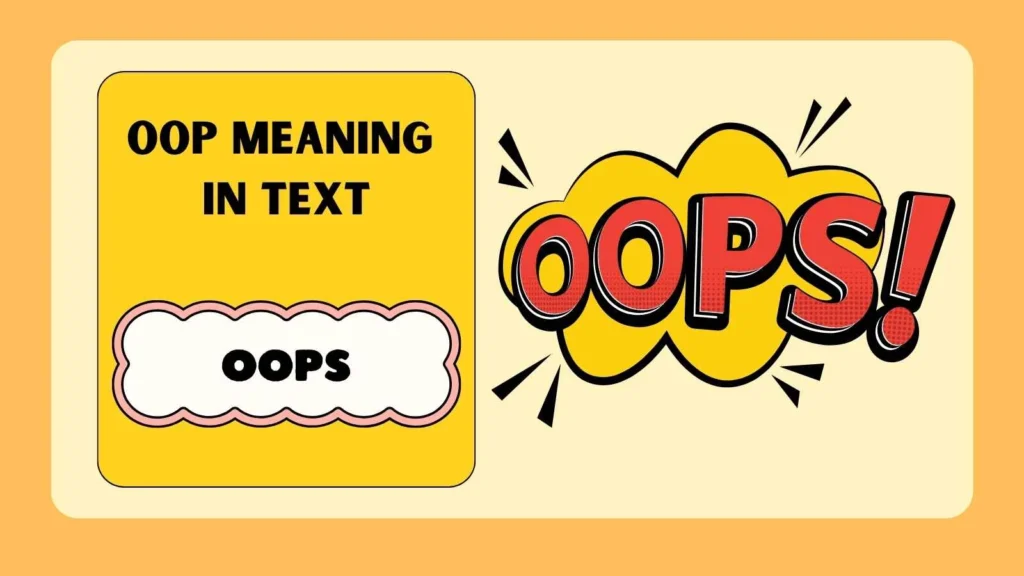Last updated on October 1st, 2025 at 09:12 am
If you’ve ever scrolled through social media, read a quick text, or joined an online chat and stumbled across OOP, you’re not alone.
This short and snappy term pops up in everyday messages, TikTok captions, and Twitter threads, leaving many people curious about its true meaning.
Whether it’s used to react to a funny moment, signal surprise, or add a playful twist to a conversation, OOP has become a digital expression worth understanding.
People search for the OOP meaning in text because it can appear in multiple contexts, from casual chats to viral memes.
Knowing what it stands for helps you stay in the loop, avoid confusion, and even add some flair to your own messages. Let’s break it down and explore the different shades of this trendy slang.
Definition & Meaning
In texting and online communication, OOP is often a playful interjection that expresses surprise, shock, or a sudden realization—similar to saying “oops” or “oh!” It’s like a digital reflex used when something unexpected happens.
For example, someone might text “OOP” when they accidentally reveal a secret, react to drama in a group chat, or notice a funny typo.
Unlike a full sentence, OOP packs meaning into just three letters, making it perfect for fast-paced conversations where brevity is key.
Background & History
The term OOP traces its popularity to internet culture and meme-driven platforms. While it sounds like a shorter form of “oops,” it became especially popular after viral moments on social media—like reality TV star Jasmine Masters’ famous “and I oop” clip, which exploded across TikTok and Twitter.
Over time, people began dropping the “and I” to simply say OOP, cementing it as a universal reaction.
Usage in Various Contexts
- Texting: A quick way to express “oops” without typing it out.
- Social Media: Used as a comment to react to gossip, shocking news, or awkward situations.
- Gaming Chats: Players use OOP to signal unexpected moves or funny mistakes.
- Memes: Often paired with GIFs to highlight dramatic or hilarious moments.
Its versatility makes OOP a favorite among Gen Z and Millennials who thrive on short, expressive language.
Common Misconceptions & Clarifications
Many assume OOP is just a typo of “oops,” but it’s more of a stylized slang. Others think it’s an acronym for something deeper—like “Out Of Place” or “Object-Oriented Programming” (in tech)—but in casual texting, it rarely stands for anything technical. Context is key to understanding the intended meaning.
Similar Terms & Alternatives
Words like oops, uh-oh, whoops, and yikes serve similar purposes, but OOP feels fresher and more playful. Memes like “and I oop” or emojis like 😳 and 🙊 often convey the same vibe in digital spaces.
How to Respond to This Term
If someone texts OOP, a simple emoji (😅, 😂, 😳) or a short reply like “same,” “lol,” or “what happened?” works perfectly. It’s usually a reaction rather than a conversation starter, so keep your response light.
Regional or Cultural Differences
OOP is mostly used in English-speaking countries like the U.S., U.K., Canada, and Australia, but global social media trends have spread it worldwide. Some cultures may interpret it simply as a funny sound rather than a slang word.
Comparison with Similar Terms
Compared to oops, OOP feels more modern and meme-driven. Unlike uh-oh, which signals worry, OOP is neutral and can be playful, awkward, or dramatic depending on context.
Usage in Online Communities & Dating Apps
On apps like Tinder, Bumble, or Discord, OOP can lighten the mood after an awkward text or a playful tease. It signals that something unexpected happened without sounding too serious.
Hidden or Offensive Meanings
Unlike many internet acronyms, OOP is generally harmless. However, in professional or coding contexts, it can stand for Object-Oriented Programming, which might confuse tech-savvy audiences. Always consider the conversation’s context before using it.
Suitability for Professional Communication
In formal emails or workplace chats, it’s best to avoid OOP unless you’re in a casual team setting. Stick to clear words like “oops” or “my mistake” to maintain professionalism.
FAQs:
What does OOP mean in texting?
It’s a slang reaction expressing surprise, shock, or a playful “oops.”
Is OOP an acronym?
Not in casual texting—it’s just a fun interjection, not a technical abbreviation.
Can OOP mean something bad?
No, it’s harmless unless used sarcastically in a negative context.
Is OOP the same as “oops”?
Similar, but OOP feels trendier and is often tied to internet memes.
Where did OOP come from?
It gained traction from social media memes, especially the viral “and I oop” clip.
Should I use OOP in work emails?
No, keep it to informal chats and social media.
Conclusion:
The OOP meaning in text is simple yet versatile—a quick way to express surprise, amusement, or an awkward moment without overexplaining.
Whether you’re reacting to a spicy group chat or a viral meme, this tiny word keeps conversations fun and effortlessly cool.
Just remember: it’s best reserved for casual settings where slang and memes thrive.
